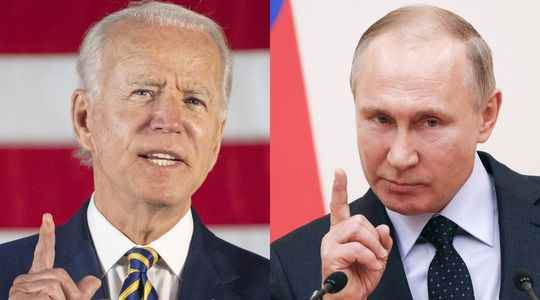For her surprise visit to Ukraine, the American “first lady” Jill Biden symbolically chose Mother’s Day – May 8, in the American calendar. That day, not far from the Polish border, she meets, in a school, her counterpart Olena Zelenska, the wife of President Volodymyr Zelensky. Embrace, bouquet of flowers, photos and declarations in front of the press: the First Lady caused a sensation. “That the White House authorized him to go to war-torn Ukraine is a huge snub to Putin, believes United States historian Françoise Coste. It is a way of telling him that he doesn’t know much about the field. And that shows the self-confidence of the Biden administration.”
In the third month (soon) of the conflict, fear has changed sides. After repelling Russian troops in kyiv in April, the Ukrainian army routed them in Kharkiv last weekend. Facing the country’s second city, Putin’s army retreated to Russia. The Russian “great offensive” in the Donbass? Announced a month ago, it still hasn’t started… And in Mariupol, the heroes of the Azovstal factory are still resisting the invader. In total, the balance sheet of Russian losses is disastrous: more than 20,000 dead, according to kyiv. And, on the material side, it’s not much better: the fleet of helicopters and tanks is decimated with Javelin and Stinger missiles.
“Before the end of the summer, Russia will have reached the maximum limit of its military capacity, predicted General Ben Hodges in an interview with L’Express. Not only will the Ukrainians have stopped the enemy advance, but they will be countering -general offensive. In September, Ukraine will have regained its borders of February 23.” A veteran of Iraq and Afghanistan, the strategist concludes: “There is now a unique opportunity to stop the Russian threat for good. This is the kind of opportunity that only comes around once in a generation.” A prediction that echoes US Defense Minister (and former General) Lloyd Austin who said last month in kyiv: “We want to see Russia weakened to the point that it cannot repeat what it did by invading Ukraine.” In other words: to prevent it from threatening all its neighbours. To achieve this objective, Washington and its allies strangle the Russian military industry. Any export of spare parts and semi-conductors (essential for the renewal of missile stock) to Russia is now prohibited. This explains why: Uralvagonzavod, the country’s largest tank manufacturer, has ceased production…
Putin’s defeats
But the strategic objectives of the American “gendarme of the world”, which announced aid of 38 billion dollars to Ukraine, go beyond the simple Ukrainian theater. “Washington’s massive support for kyiv aims to dissuade other leaders who would be tempted to draw inspiration from Putin’s adventurism, underlines Max Bergmann, of the think tank Center for Strategic & International Studies. The message is addressed both to Xi Jinping than to African presidents.” In this perspective, the strengthening of NATO, with the candidacies of Sweden and Finland, plays an essential role. For Putin, the observation is cruel: not only is he unable to seize Ukraine but in addition, the accession of Finland adds 1340 kilometers of common border with NATO on its western flank. . And there is worse: the Baltic Sea, which was once largely under the domination of the USSR, is becoming a “NATO lake”.
As for the Black Sea, essential for the export of Russian and Ukrainian grain – and therefore crucial for global food security – American strategists are already considering how to stabilize the situation there in the long term. “We need a strategy for the Black Sea, pleads General Ben Hodges who, although retired since 2018, remains close to his successors. For that, we must repair our relationship with Turkey, continue to consolidate our ties with the Romania, support Ukraine and, in the East, strengthen the young Georgian democracy, whose economic potential is considerable due to its strategic position at the entrance to Asia.”
China on the prowl
The evolution of the situation is closely followed by Beijing, which dissects the smallest facts and gestures of the United States. “This war displeases the Chinese whose growth depends on exports which, in turn, depend on global stability, underlines, while in Paris, George Friedman, analyst and founder of the think-tank Geopolitical Futures. This is why Beijing has already resumed contact with the Americans, via a communication channel in Canada. I would not be surprised, adds Friedman, if Washington were to lift certain sanctions imposed under Donald Trump. Putin’s failure is a perfect opportunity to overhaul the relationship with Beijing.”
One thing is certain: across the Atlantic, Vladimir Putin’s miscalculations arouse disbelief. “He thought that our country was divided, but did not realize that there is a difference between American domestic policy and the foreign policy of the United States, notes, in Boston, political scientist Ray La Raja. Ukraine, Democrats and Republicans are united behind the president.” Which makes historian Françoise Coste say: “Biden is not a cowboy like Reagan or a neocon like Bush. of the White House, who knows and understands Europe well, even makes Obama look old!”
